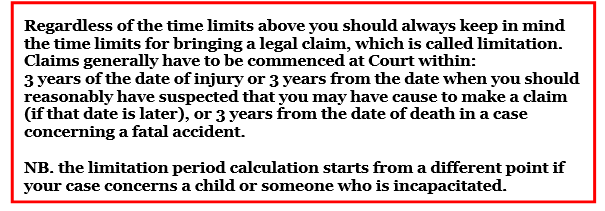How do I make a complaint about my medical treatment? Part 1
Napoleon once opined, ‘When people cease to complain, they cease to think’. But, stereotypically, the British are not known for their ability to complain. When we are in a restaurant, and the meal we are having is terrible, and the waiter comes over and asks if everything is fine: we mumble our yes thank yous whilst averting our gaze until the waiter leaves.
When it comes to your health and your medical treatment this is something significantly more important than salty soup! If something goes wrong with your medical treatment thanks to the NHS constitution and something called the “duty of candour” you have a right to:
- have any complaint you make properly investigated;
- receive an appropriate response;
- receive compensation where you have suffered harm due to negligence and;
- have all medical staff be open and honest with you when something goes wrong.
Firstly, you need to identify whether your medical treatment was through the NHS or undertaken privately as there are different procedures for both. This article will look at the first two stages of a making a complaint about your NHS treatment.
The stages of complaining

a) Informal complaint
Although you are under no legal requirement to make a complaint informally before you make a formal complaint, it is almost always best to discuss your concerns with someone as soon as possible. You can talk to the staff concerned or, alternatively, contact the Patient Advice and Liaison Service (PALS) and ask them to investigate the matter. It may be that your complaint can be resolved quickly through informal channels. However if you are not happy with their response, you can make submit a formal complaint through the hospital’s, GP’s or dentist’s local resolution service.
b) Formal complaint under local resolution
If your informal complaint has not achieved the desired outcome or, you would prefer for the complaint to be dealt with more formally, you should use the NHS complaints procedure.
i. Who can make a complaint?
If you a family member, the parent of a child who is under 16, a friend or the person who was affected by the incident, you are able to make a complaint about treatment. If someone else is complaining on your behalf you will usually need to give your permission for them to do so.
ii. Are there any time limits?
Complaints should be made as soon as possible after the incident. The NHS does impose a time limit of no later than 12 months after the event, or no later than 12 months from the date you first became aware of the issues.

When making your complaint to the NHS you can do this either verbally or in writing, but we would always recommend you put your concerns down in writing and keep copies so there is a paper trail. Key things you should include in your complaint are:
- Who/what you are complaining about?
- When did it happen?
- Where the events happened? e.g. in hospital, when you were referred by your GP, in the ambulance
- What you would like the Trust to do about it e.g. obtain a second opinion
- Whether you would like an independent clinical review: you should be aware that hospitals do not have to provide this is all circumstances
- Whether you need a copy of the investigation: we would always recommend that you ask for and obtain copies of any reviews undertaken at the hospital
After you have made your complaint, the NHS must acknowledge this within 3 working days. This acknowledgment should explain how your complaint is going to be investigated, offer you an opportunity to discuss your concerns, and give you an estimate of time scales.
At the end of the investigation you should receive a formal written response.
iii. What if I am not happy with the response I received?
If you are not satisfied with the final response you receive from the hospital you have the right to request an independent review of your complaint by the Parliamentary and Health Service Ombudsman. However, before you turn to the Ombudsman you must ensure that you have done all you can to resolve matters at a local level.
Whilst patients may not think that making a complaint will make a difference, hospitals do take patient concerns seriously and, once investigated, they can sometimes lead to changes in policies and admissions of failings. As a solicitor I would generally recommend that my clients continue with their NHS complaints as they can often inform any potential litigation. Also, as a solicitor, I can only achieve a financial compensation for my clients; the complaint system can offer you the opportunity to sit down with the individuals involved with your incident or give you the chance to obtain an apology for the treatment you received.

No comments